U.S. Economy Contracts 3.8% as Wallstreet Rewards Failure with Bailout Cash
Stock-Markets / Recession 2008 - 2010 Jan 30, 2009 - 04:11 PM GMT The U.S. economy shrank the most in the fourth quarter since 1982 as consumer spending recorded the worst slide in the postwar era, a trajectory that's likely to continue in coming months.
The U.S. economy shrank the most in the fourth quarter since 1982 as consumer spending recorded the worst slide in the postwar era, a trajectory that's likely to continue in coming months.
The 3.8 percent annual pace of contraction was less than forecast, with a buildup of unsold goods cushioning the blow. Excluding inventories, the decline was 5.1 percent, the Commerce Department said today in Washington. A survey of purchasing managers also indicated today that business in January was the weakest in almost 27 years.
The Institute for Supply Management-Chicago said today its business barometer decreased to 33.3 from 35.1 the prior month. The index has remained below 50, the dividing line for contraction, for four months. Meanwhile, consumer confidence rose less than forecast this month, a Reuters/University of Michigan index showed. The gauge climbed to 61.2 from 60.1 in December.
A new reality for Wall Street.
The Wall Street bonus , considered a sacred ritual, may become the industry's biggest casualty as governments worldwide bail out financial institutions.
The current system of “asymmetric compensation,” in which people are rewarded when they do well and aren't required to return the rewards when they lose money, is detrimental to society and needs to change, said Nassim Taleb , a professor at New York University and author of “The Black Swan: The Impact of the Highly Improbable,” in an interview.
Will the January stock barometer signal a freeze?
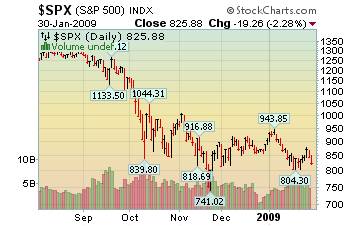 -- U.S. stocks fell, paring the first weekly advance in a month for the Standard & Poor's 500 Index, as more companies reported disappointing earnings and the economy contracted at the fastest pace in 26 years. The slide in the S&P 500 so far this year suggests the so- called January barometer will signal a loss for 2009. The indicator was developed by Yale Hirsch , chairman and founder of the Stock Traders' Almanac, and built on the theory that the S&P 500's first-month performance sets its course for the year. Since 1950, the barometer has been at least 80 percent accurate.
-- U.S. stocks fell, paring the first weekly advance in a month for the Standard & Poor's 500 Index, as more companies reported disappointing earnings and the economy contracted at the fastest pace in 26 years. The slide in the S&P 500 so far this year suggests the so- called January barometer will signal a loss for 2009. The indicator was developed by Yale Hirsch , chairman and founder of the Stock Traders' Almanac, and built on the theory that the S&P 500's first-month performance sets its course for the year. Since 1950, the barometer has been at least 80 percent accurate.
Bonds are rapidly giving back their gains.
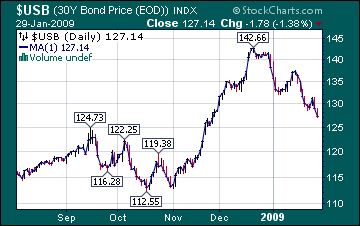 -- Treasuries rose, trimming the steepest monthly loss in almost five years, as a government report showed the economy shrank in the fourth quarter the most since 1982.
-- Treasuries rose, trimming the steepest monthly loss in almost five years, as a government report showed the economy shrank in the fourth quarter the most since 1982.
U.S. debt gained for the first time in three days as the Commerce Department said gross domestic product contracted at a 3.8 percent annual pace from October through December. The GDP price index declined for the first time since 1954.
Investors flee to gold.
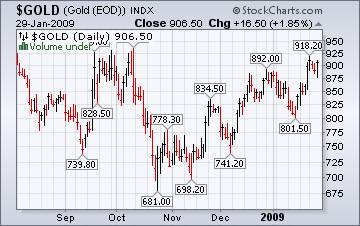 ( Bloomberg ) -- The same unprecedented steps that central bankers are taking to rescue the banking system are driving investors to gold, the commodity investors buy when they lose confidence in financial assets. The combination of central banks spending trillions of dollars to prop up the banking system in the worst financial crisis since the Great Depression has caused gold to appreciate this year. Can it last?
( Bloomberg ) -- The same unprecedented steps that central bankers are taking to rescue the banking system are driving investors to gold, the commodity investors buy when they lose confidence in financial assets. The combination of central banks spending trillions of dollars to prop up the banking system in the worst financial crisis since the Great Depression has caused gold to appreciate this year. Can it last?
Japanese stocks nearing the tipping point.
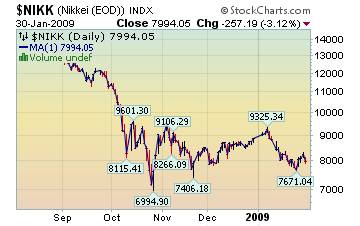 -- Japan headed for its worst postwar recession as factory production slumped an unprecedented 9.6 percent, NEC Corp. said it will cut more than 20,000 workers and Hitachi Ltd. forecast a record loss.
-- Japan headed for its worst postwar recession as factory production slumped an unprecedented 9.6 percent, NEC Corp. said it will cut more than 20,000 workers and Hitachi Ltd. forecast a record loss.
The December drop in output eclipsed the previous record of 8.5 percent set only a month earlier, the Trade Ministry said today in Tokyo. NEC, Japan's biggest personal-computer maker, forecast its first loss in three years.
Developing economies linked directly to U.S.
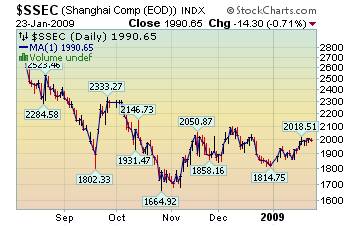 -- With developing economies savaged by the global economic downturn, emerging market investors are looking back to where the crisis began to show the first signs of recovery.
-- With developing economies savaged by the global economic downturn, emerging market investors are looking back to where the crisis began to show the first signs of recovery.
Emerging markets might have seen booming domestic demand and been trading more with each other than ever before, but with developed demand -- particularly U.S. demand -- taken out of the equation, growth is braking sharply and unemployment rising.
No-one uses the word "decoupled" seriously any more.
Which is it…the Yuan weakening or the Dollar strengthening?
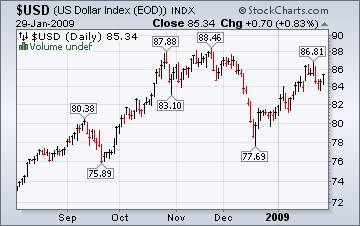 ( Bloomberg ) -- .S The dollar and the yen headed for their biggest monthly gains versus the euro since October as growing evidence of a global slowdown increased the appeal of the currencies as a refuge from the financial crisis.
( Bloomberg ) -- .S The dollar and the yen headed for their biggest monthly gains versus the euro since October as growing evidence of a global slowdown increased the appeal of the currencies as a refuge from the financial crisis.
“For many investors the strategy is simple: avoid risk,” said Tsutomu Soma , a bond and currency dealer at Okasan Securities Co. in Tokyo. “That means funds are flowing back into the dollar and the yen. We can't expect any good economic news from the U.S. or other major economies.”
Where the deals are.
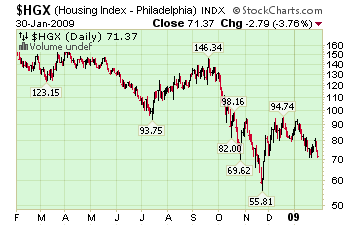 Nearly 45% of the sales reported by the National Association of Realtors Monday were "distress" related, suggesting that only now are the first rounds of foreclosed homes reaching prices marked down enough to attract interest. And Monday's blizzard of more than 70,000 pink slips clearly represents an ominous intensification of economic woes.
Nearly 45% of the sales reported by the National Association of Realtors Monday were "distress" related, suggesting that only now are the first rounds of foreclosed homes reaching prices marked down enough to attract interest. And Monday's blizzard of more than 70,000 pink slips clearly represents an ominous intensification of economic woes.
This trend will probably continue for some time.
Gasoline prices starting to dip in the Midwest?
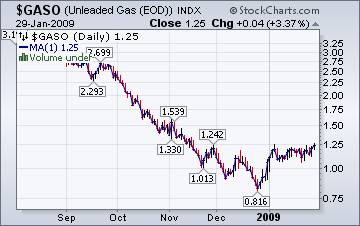 The Energy Information Administration reports that, “Reversing the trend of the previous three weeks, the national average price of gasoline dropped 0.9 cent to 183.8 cents per gallon. As a result, the price was 113.9 cents lower than the price a year ago. On a regional basis, price changes were mixed, moving up in three regions, down in one region, and unchanged in one region. The price on the East Coast inched up 0.6 cent to 181.6 cents per gallon. Compared to changes in the other regions, the price in the Midwest dropped sharply, falling 5.4 cents to 182 cents per gallon.”
The Energy Information Administration reports that, “Reversing the trend of the previous three weeks, the national average price of gasoline dropped 0.9 cent to 183.8 cents per gallon. As a result, the price was 113.9 cents lower than the price a year ago. On a regional basis, price changes were mixed, moving up in three regions, down in one region, and unchanged in one region. The price on the East Coast inched up 0.6 cent to 181.6 cents per gallon. Compared to changes in the other regions, the price in the Midwest dropped sharply, falling 5.4 cents to 182 cents per gallon.”
The bitter cold winter is having no effect on natural gas prices.
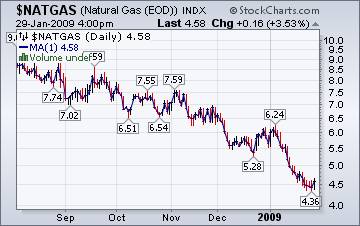 The Energy Information Agency's Natural Gas Weekly Update reports, “ Despite an arctic blast of frigid temperatures enveloping most of the Lower 48 States, natural gas spot prices generally continued to show considerable weakness, decreasing at most market locations in the Lower 48 States, and posting relatively modest increases at other locations since Wednesday, January 21. ”
The Energy Information Agency's Natural Gas Weekly Update reports, “ Despite an arctic blast of frigid temperatures enveloping most of the Lower 48 States, natural gas spot prices generally continued to show considerable weakness, decreasing at most market locations in the Lower 48 States, and posting relatively modest increases at other locations since Wednesday, January 21. ”
Is Washington really advocating free markets?
“It is hard to imagine a more blatant push towards nationalization of the banks (already a legalized cartel). Further guarantee of the debt of financial institutions — already overburdened with high-risk debt in exchange for the government taking equity positions — is preposterous. The notion of privatized profits combined with losses guaranteed by the taxpayers is usually not what comes to mind when someone touts their strong beliefs in a free-market economy.
Yet these ideas are openly set forth as a solution to the economic problems currently faced in America and around the world. Paul Krugman has commented that President-elect Obama's proposed stimulus plan will not go far enough , i.e., the level of expropriation is not deemed to be high enough to succeed. These ideas, dominated by Keynesian economic thought, are openly discussed — and proposed by the most recent laureate of the Prize in Economic Sciences in Memory of Alfred Nobel, no less — and it seems that the vast majority of the American citizenry pay no attention as the man behind the curtain steers our nation ever more rapidly along the road to socialism.
We're on the air every Friday.
Tim Wood, John Grant and I are back in our weekly session on the markets. The market has been a real roller coaster ride this week. You will be able to access the interview by clicking here .
New IPTV program going strong.
This week's show on www.yorba.tv is packed with information about the direction of the markets. I'm on every Tuesday at 4:00 pm EDT . You can find the archives of my latest programs by clicking here .
Please make an appointment to discuss our investment strategies by calling Claire or Tony at (517) 699-1554, ext 10 or 11. Or e-mail us at tpi@thepracticalinvestor.com .
Anthony M. Cherniawski,
President and CIO
http://www.thepracticalinvestor.com
As a State Registered Investment Advisor, The Practical Investor (TPI) manages private client investment portfolios using a proprietary investment strategy created by Chief Investment Officer Tony Cherniawski. Throughout 2000-01, when many investors felt the pain of double digit market losses, TPI successfully navigated the choppy investment waters, creating a profit for our private investment clients. With a focus on preserving assets and capitalizing on opportunities, TPI clients benefited greatly from the TPI strategies, allowing them to stay on track with their life goals
Disclaimer: The content in this article is written for educational and informational purposes only. There is no offer or recommendation to buy or sell any security and no information contained here should be interpreted or construed as investment advice. Do you own due diligence as the information in this article is the opinion of Anthony M. Cherniawski and subject to change without notice.
Anthony M. Cherniawski Archive |
© 2005-2022 http://www.MarketOracle.co.uk - The Market Oracle is a FREE Daily Financial Markets Analysis & Forecasting online publication.



